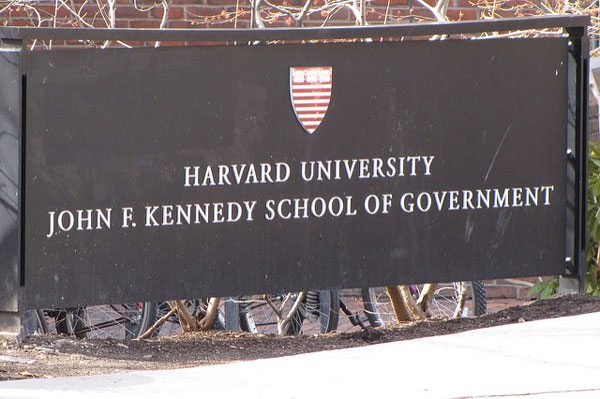
February 27, 2018; Harvard Crimson
In the past few months, NPQ has frequently discussed the issue of tainted donors, and how nonprofits should determine who is allowed to ally themselves to an organization’s mission through financial support.
Harvard University’s John F. Kennedy School of Government faces just such a quandary, as some students and faculty have voiced concern over the large amounts of money the Koch Foundation has donated to the school. According to the Harvard Crimson, “Charles Koch has made several millions-dollar donations to the Harvard Kennedy School in recent years.” The dean claims that the donation does not affect the school’s decisions, but the Kochs have made a habit of spending large amounts of money in higher education to promote the teaching of their libertarian ideology all over the country; is Harvard very different?
Kennedy School spokesperson Doug Gavel said, “We accept funding from external sources, but those sources do not dictate or unduly influence the results of our research, our policy recommendations, what we teach, or whom we accept into our community.”
The Kennedy School has made explicit efforts in recent years to include more conservative points of view in its teachings, at the same time that universities around the country are being criticized as liberal silos. This year, “Students have criticized…the Sept. 2017 visit of United States Secretary of Education Betsy DeVos and visiting fellowships offered to former Trump Administration officials Sean Spicer and Corey Lewandowski.” Student Jeff Rousset explained, however, that “it wasn’t because they were conservative, it was because they were complicit in what many of us saw as really unethical behaviors and sometimes even illegal behaviors.”
The Kochs are a polarizing force at Harvard and elsewhere. ThinkProgress has described their agenda as “anti-renewable energy, pro-fossil fuel,” and the Salt Lake Tribune described it as “anti-tax, anti-regulation.” The Atlantic described them as “libertarian.” They have spent millions of dollars promoting policy and politicians in line with their views, and have promised to spend even more in 2018.
Sign up for our free newsletters
Subscribe to NPQ's newsletters to have our top stories delivered directly to your inbox.
By signing up, you agree to our privacy policy and terms of use, and to receive messages from NPQ and our partners.
They are specifically spending a lot in higher education. The Wall Street Journal reports:
A foundation backed by the libertarian billionaire Charles Koch gave away $77 million in 2016, primarily to hundreds of colleges and universities, according to its latest tax filing. That marks a dollar increase of 75 percent from the previous year, when it gave away $44 million. The foundation is on pace to donate $120 million this year, again mainly to institutions of higher education.
The Charles Koch Foundation website lists hundreds of academic institutions receiving support.
Sometimes, no doubt, the money is given without strings attached…but not always. At Florida State University, a memorandum of understanding stipulated that the Koch foundation was to help select one member of the three-person board that would “consult…regarding the qualifications of candidates for any Professorship Position.” In Utah, they “fund[ed] an independent think tank staffed by Utah State University professors, while simultaneously giving millions to the university to spread an anti-regulation ideology among its students.” Salon claimed that, “Koch money also installs professors who will publish libertarian-minded economics papers and teach students about the benefits of abolishing taxes and ending regulation, and it funds graduate students in these programs, grooming them to become the next great Koch scholars.”
The Kennedy School is determined to maintain its independence. Professor Stephen Walt, the co-director of the “The Project on Grand Strategy, Security, and Statecraft,” said the grant given by the Koch Foundation would not impact their fellowship program’s admissions decisions. Dean Douglas Elmendorf said, “Universities are, at their core, places to develop and transmit knowledge and that knowledge can be unpleasant or inconvenient.” Elmendorf, who served as the Director of the Congressional Budget Office under President Barack Obama, was ousted in 2015 and replaced by Keith Hall, who opposes both government aid programs and a higher minimum wage, much like the Kochs.
It may indeed be the case that the Koch donations to the Kennedy School are entirely without strings and have no bearing whatsoever on the university’s decisions as far as hiring, student acceptance, and research go. However, the very fact that other universities’ Koch alliances are not so clean should give Kennedy School leaders and other decision-makers pause.“Is the financial freedom offered by multimillion-dollar grants worth the cost of association with a tainted ally like the Kochs? Should students have a voice in these decisions? Even if Harvard’s nose is clean, the pattern of Koch educational giving may come to taint their reputation. That’s a high price to pay for a school that has named itself after one of the nation’s most beloved political figures. Figuring out the best interests of the university may require some political calculation as well as governance.—Erin Rubin













